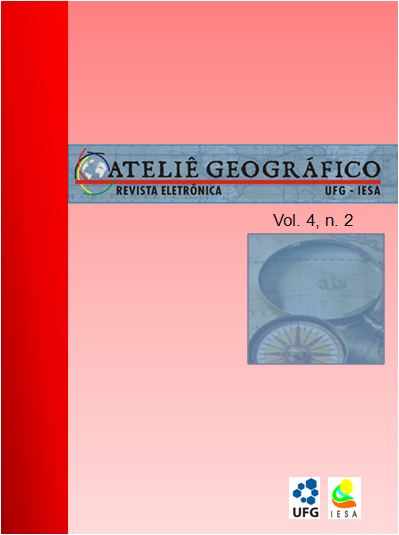MALOCAS AND PERIPHERY: the production of Restinga Neighborhood
DOI:
https://doi.org/10.5216/ag.v4i2.9911Abstract
The space is produced through the articulation between the state institutions (i.e.government) and the neighborhood relationships – normally they superimpose each other. From this logic, the space Restinga, a neighborhood in the south of Porto Alegre, RS, Brazil, is understood. First, it is seen as a creation of the State, from the segregation of the population from irregular villages. It is also a technocratic thought which, through the use of force or marketing devices – urban space as a commodity –, determines the individuals’ place in the city. Second, as a space where people build their lives, making strategies, changing the forms and constitutes private relationships. Thus, Restinga neighborhood is produced, as well as the production of its representations, which stigmatizes the individuals and, on the other hand, consolidates emotional links with the neighborhood.Downloads
Download data is not yet available.
Downloads
Published
2010-05-13
How to Cite
GAMALHO, Nola Patrícia. MALOCAS AND PERIPHERY: the production of Restinga Neighborhood. Ateliê Geográfico Journal, Goiânia, v. 4, n. 2, p. 122–141, 2010. DOI: 10.5216/ag.v4i2.9911. Disponível em: https://revistas.ufg.br/atelie/article/view/9911. Acesso em: 25 feb. 2026.
Issue
Section
Articles
License
Autores que publicam nesta revista concordam com os seguintes termos:- Autores mantém os direitos autorais e concedem à revista o direito de primeira publicação, com o trabalho simultaneamente licenciado sob a Licença Creative Commons Attribution que permite o compartilhamento do trabalho com reconhecimento da autoria e publicação inicial nesta revista.
- Os autores não serão remunerados pela publicação de trabalhos na Revista Ateliê Geográfico. Além disso, os conteúdos publicados são de inteira e exclusiva responsabilidade de seus autores, ainda que reservado aos editores o direito de proceder a ajustes textuais e de adequação às normas da publicação.
- Autores têm permissão e são estimulados a divulgar seu trabalho online (ex.: em repositórios institucionais ou na sua página pessoal), já que isso pode gerar alterações produtivas, bem como aumentar o impacto e a citação do trabalho publicado (Veja O Efeito do Acesso Livre).


